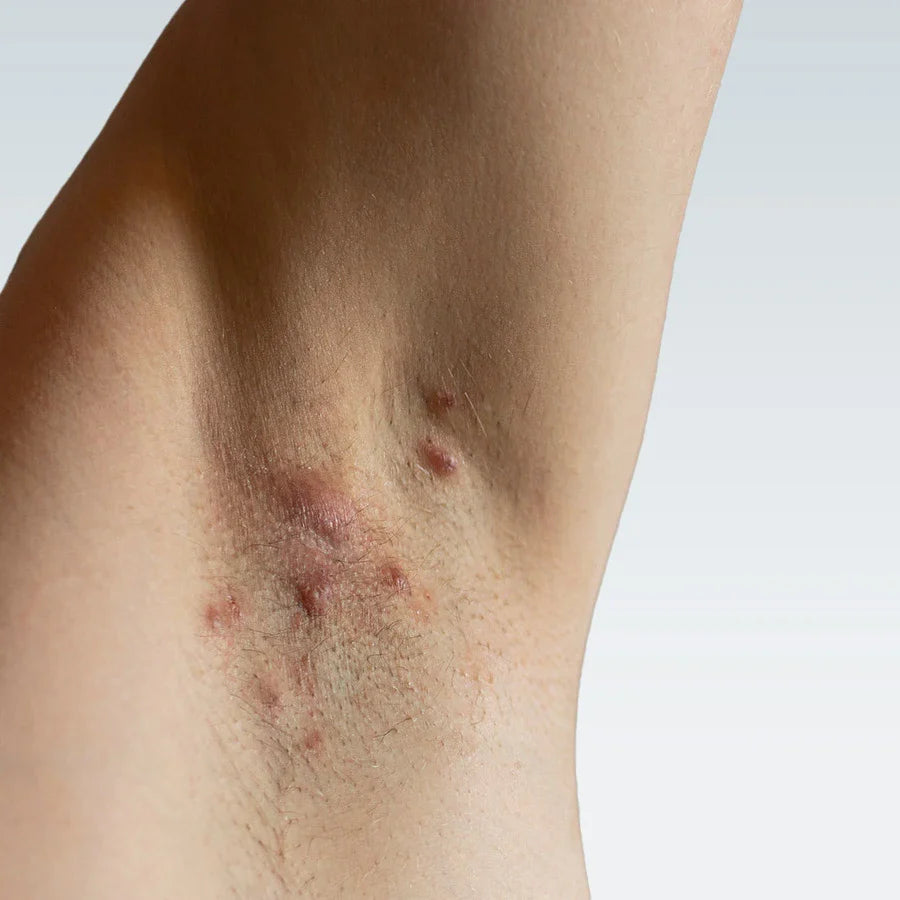Living with a chronic skin condition like Hidradenitis Suppurativa (HS) can be challenging. It affects many individuals, causing painful, inflamed lumps, abscesses, and sometimes scarring, often in sensitive areas like the armpits, groin, and under the breasts. However, if you or someone you know is managing HS, laser hair removal might be a helpful solution in alleviating some of the symptoms and boosting confidence.
What is Hidradenitis Suppurativa?
Hidradenitis Suppurativa is an inflammatory skin condition that occurs when hair follicles become blocked and inflamed. It typically appears in areas where skin rubs together, such as the armpits, groin, under the breasts, and around the buttocks. HS can cause painful lumps that can rupture, leading to abscesses, tunnels, and scarring. It is a condition that often has flare-ups triggered by factors like heat, sweating, friction, or even shaving.
While there is no cure for HS, several treatments can help manage the symptoms. One such treatment that many people with HS find beneficial is laser hair removal.
How Laser Hair Removal Helps Those with HS
Laser hair removal is a non-invasive procedure that uses concentrated light to target hair follicles, inhibiting their ability to grow hair. It is not only effective for removing unwanted hair but also offers numerous benefits for individuals with Hidradenitis Suppurativa:
1. Reduced Friction and Irritation:
Shaving or waxing the affected areas can cause irritation and aggravate HS symptoms. The repeated friction and use of razors can lead to more flare-ups and discomfort. By removing the hair, laser treatments help reduce the friction in areas prone to outbreaks, providing relief from painful lumps and abscesses.
2. Lessening the Risk of Ingrown Hairs:
Ingrown hairs are a common issue for individuals with HS. When hair grows back after shaving or waxing, it can become trapped under the skin, causing further irritation and inflammation. Laser hair removal prevents hair regrowth, minimizing the risk of painful ingrown hairs and reducing the chances of flare-ups.
3. Long-Term Solution:
Unlike shaving or waxing, laser hair removal offers a more permanent solution. As the treatment targets the root of the hair follicle, it can result in long-term hair reduction. This means less maintenance and fewer opportunities for skin irritation or outbreaks associated with traditional hair removal methods.
4. Improved Skin Appearance:
One of the side effects of HS is the scarring and pigmentation changes that can occur in the affected areas. While laser hair removal does not directly treat scarring, by reducing the frequency of flare-ups and preventing irritation, it can contribute to a smoother, more even skin texture over time. The reduction in inflammation may also result in less visible scarring.
The Medical Evidence
There is medical evidence supporting the use of laser hair removal for individuals with Hidradenitis Suppurativa. Studies have shown that laser hair removal can significantly reduce the occurrence of flare-ups and improve the overall condition of the skin. For instance, a study published in the Journal of Dermatological Treatment in 2014 found that laser hair removal was a promising treatment option for individuals with HS, as it helped reduce the number of inflammatory lesions and discomfort associated with the condition.
Furthermore, laser hair removal is recommended by many dermatologists as part of a comprehensive treatment plan for HS, particularly for patients who experience frequent flare-ups in areas where hair growth contributes to irritation.
How LaserHQ Supports Clients with Hidradenitis Suppurativa
At LaserHQ, we understand the challenges that come with managing a condition like Hidradenitis Suppurativa. Our team of trained professionals is dedicated to providing personalised care and ensuring that each treatment is safe, effective, and comfortable for those with sensitive skin conditions.
1. Tailored Treatments:
We take the time to understand your specific needs and create a treatment plan that works for you. Our laser hair removal experts are experienced in working with individuals who have HS, and we use advanced technology that is gentle yet effective on sensitive skin.
2. Expert Guidance:
We recognise that every client’s experience with HS is unique. Our specialists offer expert advice on how to manage symptoms, prepare for laser hair removal, and care for your skin before and after the treatment to achieve the best results.
3. Creating a Comfortable Experience:
We know that dealing with HS can be frustrating, and we’re committed to ensuring that your laser hair removal sessions are as comfortable as possible. Our state-of-the-art equipment is designed to minimise discomfort, and our team makes sure you feel at ease throughout the process.
4. Boosting Confidence:
One of the most empowering aspects of laser hair removal for individuals with Hidradenitis Suppurativa is the confidence boost it provides. By reducing hair regrowth and minimising the risk of flare-ups, many of our clients feel more comfortable in their skin. This can be life-changing for those who struggle with the emotional and psychological effects of HS, especially in visible areas.
Conclusion
Hidradenitis Suppurativa is a challenging condition, but it doesn’t have to define your confidence. Laser hair removal can be a powerful tool in managing the symptoms of HS, offering relief from irritation, reducing the risk of ingrown hairs, and providing long-term benefits that help you feel more comfortable in your skin.
At LaserHQ, we’re here to support you in your journey toward smoother, healthier skin. If you have Hidradenitis Suppurativa and are considering laser hair removal, we invite you to book a consultation with us. Our team is dedicated to helping you feel more confident and comfortable, no matter your skin condition.


